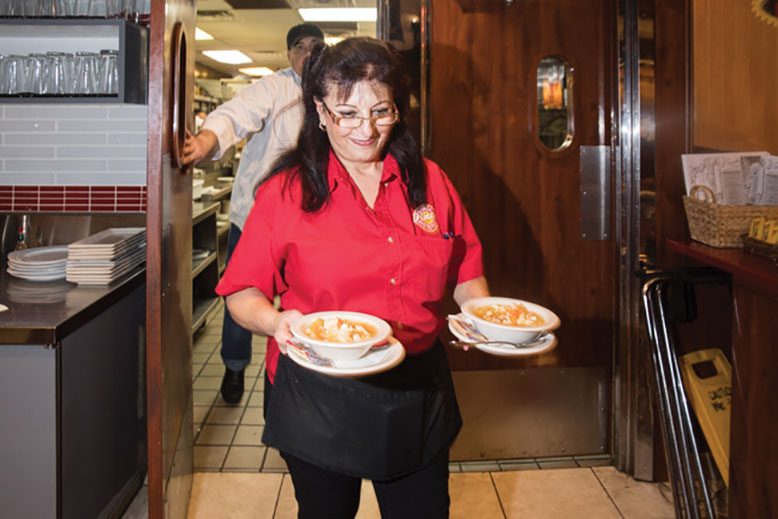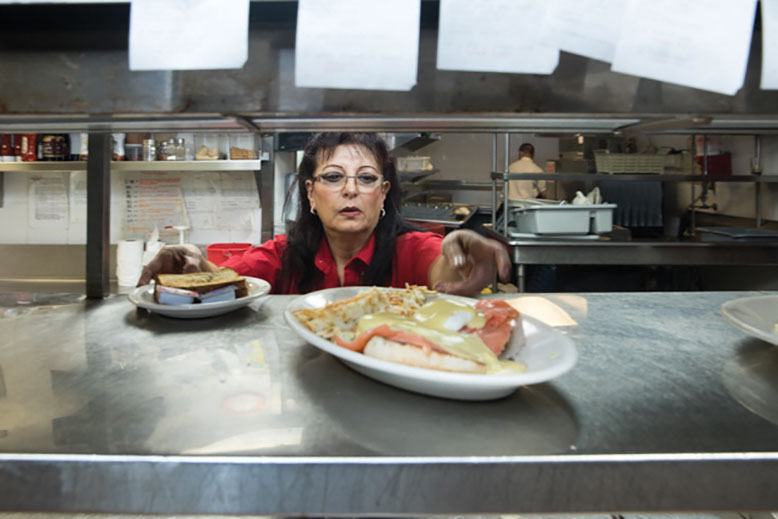
3:45 AM: Amal “Molly” Kaydouh gets up in the dark. Padding around her North Arlington apartment on this Tuesday morning, she reaches for one of her five identical red shirts appliqued with the Nevada Diner’s logo, along with a black apron, leggings and, crucially, non-skid shoes. She brightens the ensemble with sparkly earrings and painstakingly applies makeup, because appearance counts.
Driving to the diner in Bloomfield, she stops at a Dunkin’ Donuts for an espresso and smokes a single Salem menthol in her car. By 6 am she’s on the job, cleaning every surface in the back room—tables, booths, saltshakers. She makes pots of coffee and restocks bins of ketchup packets and plastic Cream-O-Land containers.
And then she waits.
8:15 AM: “Here come my customers,” says Kaydouh, with some relief. It’s been slow so far, aside from a guy whose car got a flat outside on Broad Street. Happily, the regulars—representing economic bread and butter for diner owners and their tip-reliant servers—are arriving with a chorus of hellos.
Kaydouh brings coffee to Anthony Fiumefreddo, a retired cop, and his friend Jim Arace before they’ve even shrugged off their jackets.
“How you doin’, Molly?” Fiumefreddo says, using Kaydouh’s nom de diner.
“Where’s number 3?” she asks; another friend customarily joins them.
“He’s working.”

Photo by Christopher Lane
Kaydouh has to pose the question, “The usual?” because, while Arace reliably orders two eggs over with grits and Taylor ham, Fiumefreddo occasionally changes up. Today, he wants an omelet.
But the juice orders never change. Kaydouh knows to bring glasses of orange and pineapple. Then she enters the order in the computer and heads for the kitchen to make the toast and ladle out the grits, adeptly kicking the kitchen door open when she returns, forearms full of plates.
A veteran diner waitress just knows. She knows that when two brothers-in-law who meet for breakfast every other week take a booth, she should ready a takeout container because one guy “likes his eggs here, but his french fries to go.”
She spots Neil Platt in the parking lot and has coffee and milk on the way before he steps through the door. Then, she knows not to ask what he wants to eat. Platt stops almost daily en route to his office in Montclair, but prefers to do the Daily News crossword puzzle (“my morning ritual”) before deciding between scrambled eggs, a spinach omelet or something lighter.
In a few minutes, they perform a near-telepathic routine across the room: Platt cups his hands, looking quizzical. This apparently means: “How’s the fruit bowl today?” Kaydouh checks the refrigerator, gives the thumbs up. He nods. She makes a scooping gesture to ascertain whether he wants yogurt on top.
“She sort of reads your mind,” Platt says when she brings a bowl of bananas, strawberries, blackberries and melon, no yogurt.
“It’s like having a second wife,” Arace agrees.
Kaydouh, who emigrated from Lebanon as a teenager, has been a diner waitress for 30 years, first at a Bloomfield luncheonette and then, after a detour into hotel housekeeping, at the Char-Broil in Upper Montclair. In 2011, the day after a fire that shuttered the Char-Broil for months, Kaydouh went to the Nevada looking for work. Alex Nissirios, the co-owner, hired her on the spot. She’s 62 now and works the 6-to-3 shift five days a week.
In hiring servers, Nissirios looks for energetic people who can hustle and who have enough smarts to use the computer that tracks orders. But “the most important thing,” he says, “is personality. They have to be pleasant, friendly. A successful business should feel like home.”
That comes easily to Kaydouh, who dispenses endearments (“How are you, honey?” “Thank you, my dear!”) as freely as extra napkins. Perhaps her most-used phrase, when someone asks her to hold the onions or bring an extra pickle, is, “You got it.”
“Her customers feel taken care of,” says Randy Bulagao, the day manager, himself a former server who long ago learned that “you don’t look at the customers and just see dollar signs.” Though sometimes, given the economic realities, it’s hard not to.
9:45 AM: Kaydouh grabs a rare two-minute break involving three cigarette puffs by the unheated loading dock (“our smoking lounge”). Then two older couples come by for leisurely late breakfasts, and she hurries to greet them.
John and Mary O’Connor, retired educators, eat breakfast here three or four times a week and know her well enough to ask about her family: her son the state trooper, her beautician daughter and two teenage grandchildren. The O’Connors are not only affable customers, but dependable 20 percent tippers.
Kaydouh doesn’t recognize the couple in the next booth poring over the Nevada’s enormous menu—15 laminated pages plus a sheet of daily specials. They could prove generous, or not. In this business, tips aren’t merely a gesture, a thank you for good service; they are what allow servers to earn a living wage, if they do.
For decades, the federal minimum wage for tipped workers has been—not a typo—$2.13 an hour. If, on a too-quiet day, a server’s wage and tips don’t amount to the New Jersey minimum wage, which rose to $8.60 this year, the employer must make up the difference. But if the server’s total exceeds $8.60 an hour, usually the case at a busy place like this, the employer only pays $2.13, a system that handily shifts labor costs from employers to customers.

Photo by Christopher Lane
Now and then, a server scores. Part of Nevada lore is the businessman, dining solo a few Christmases ago, who ordered a cheeseburger, then put a stack of bills on the table for waitress Marsha DuBois: $250.
“It was too much,” says DuBois, now the evening manager. “For a cheeseburger? Come on.” She didn’t want to take the money, but the customer handed it to the manager to give to her.
Kaydouh hasn’t lucked into that kind of extravagance, but several times a year, a quartet of retirees drives all the way from Pennsylvania, passing who knows how many diners en route, to sit at her table at the Nevada, a place they discovered on a vacation.
“They call first and ask for me,” she reports. “I’m not here, they don’t come.” They sit for two to three hours yakking, reading the papers, doing crossword puzzles and running up a roughly $50 tab. They leave $40 for Kaydouh.
Overall, Bulagao estimates, experienced servers working full-time can average $15 an hour, though they’re expected to share 15 percent of that with the busboy. That figure sounds high to Kaydouh, but she has never calculated her hourly wage. She just knows that a busy nine-hour shift on a weekend can net her $180 to $200, while yesterday she went home with a paltry $42.
Today looks more promising.
11:30 AM: Lunchtime, the tempo picks up. “Yankee bean, cream of broccoli, or chicken with pasta,” Kaydouh says, reciting the soups. Meanwhile, she never stops making fresh pots of coffee.
“Look who’s here!” sings out Grace Baumgarten, one of many who followed her from the Char-Broil, giving Kaydouh a hug.
Kaydouh: “How’s the family?”
“You’ll get to see them in person.” Baumgarten is meeting her sons for lunch.
Between orders, Kaydouh gulps her own lunch—half a cup of soup in a paper cup—in the kitchen. Nevada servers get a half-hour break each shift and a free meal up to $10—beyond that, they’re charged, just as they pay for uniform shirts beyond the first one. But Kaydouh never sits down. “You have to be watching your tables,” she says.

Photo by Christopher Lane
Besides, she might struggle to get up. After the first few hours on the job, pain hits her knees “like needles.” Ice packs at home, nighttime knee braces, 500-pill bottles of Aleve and, for a while, weekly injections from an orthopedist—nothing helps much. Then last week, her back gave out as she hoisted a heavy tray. The doctor prescribed meds, but “it’s killing me,” she says—not that she missed a day’s work.
Jersey’s fondness for diners shouldn’t obscure how hard the work is. Most Nevada servers rely on some combination of stretches, hot showers and ibuprofen to keep going. Kaydouh, who previously worked a six-day week, cut back to five days in March. At least she has health insurance, plus a doting son who replaced her aging Buick with a new Hyundai and helps with bills occasionally. Diners with more than 50 full-time workers are required to provide health insurance under the Affordable Care Act, says Marilou Halvorsen, president of the New Jersey Restaurant and Hospitality Association. Smaller diners like the Nevada don’t face that requirement, and their servers often lack health coverage, paid sick leave or paid vacation.
But Kaydouh’s smile never slips. She likes her job and feels grateful for it. She bristles only once, privately, when a couple with a toddler seems to treat her dismissively. “No ‘hello,’ no ‘thank you,’ no nothing,” she mutters.
On the other hand, the day before Valentine’s Day, a man came in at lunch—Kaydouh recognized him as a weekend patron, but didn’t know his name—and shyly handed her two red envelopes. He’d carefully addressed one to “Miss Mollie” and the other to her coworker, “Miss Eleni.”
Startled, Kaydouh managed to say thank you. Inside, the man had written, in capital letters: “Too seldom said but often thought—you are appreciated.” He signed it, “Sincerely, Frank, 1 of your customers.”

Photo by Christopher Lane
1:30 PM: “Can I go home now?” Kaydouh asks nobody in particular, leaning against the counter. “I can’t stand up any more.” Normally on duty until 3, she’s hoping to leave an hour early to see her son, who’s been ill the past few days. But her tables keep filling: a young woman incessantly on her phone, sounding distraught, who orders a burger and a glass of pinot grigio; a man who brings his stepfather, in a wheelchair, for lunch twice a week; three women from the senior residence nearby.
Finally, the last table empties and Kaydouh can settle up, pocket her earnings and drive home. She contemplates returning to Lebanon one day, years in the future. Her family has homes and small businesses there, and her eventual Social Security check would go farther. But her son wants to buy a house at the Shore for the two of them, and that sounds appealing, too. For now, she’s here Friday through Tuesday, sounding friendly, looking stylish, remembering which customer likes his toast nearly burnt.
Today’s take, after leaving the busboy his share: $63.
Paula Span writes The New Old Age and Generation Grandparent columns for the New York Times and teaches journalism at Columbia University. She lives in Montclair.

I know how hard they work and I despise people who stiff their waitress….to the point I’d slap the taste out of their mouth……unless you got a brutally nasty one…..i don’t get mad if the order is wrong or whatever…..shit happens